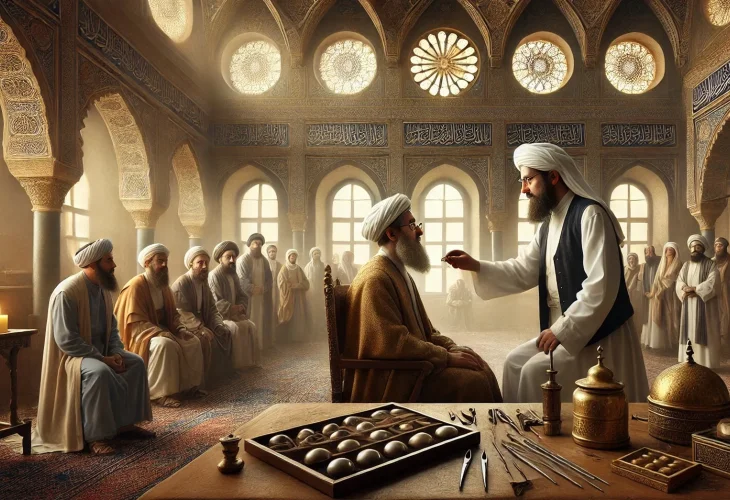The Remarkable Legacy of Assad: The Jewish Doctor Who Impressed the Islamic World
Known for his diagnostic genius, Assad could discern a person's profession and ailments just by observing them. This is the incredible story of Assad, the Jewish oculist admired by Muslims.

Yes, it’s true—our story features a Jewish oculist named Assad. Living around 800 years ago, he practiced various fields of medicine, including surgery, but gained fame chiefly as an exceptional eye doctor.
The Arab historian Khalil ibn Ibiq al-Safadi, who resided in Safed, authored a unique book detailing 1,900 figures from his time, one of whom was the Jewish doctor known as Usayda. He wrote: "Assad the Jewish doctor, also called Usayda, was extremely wise, knowledgeable particularly in theology and the natural sciences. He earned his living as a surgeon and excelled as an oculist, unparalleled in his skills at treating and setting broken bones. He performed prominent surgeries for high-ranking emirs, such as Emir Bada al-Din Baydrar, the deputy of Sultan al-Ashraf Khalil in Acre, and Emir Sanjar al-Dawadari."
"Regarding Assad, the great poet Ala al-Din al-Wudai wrote: 'Oh people, here stands the great sultan, akin to Daniel, who through miracles was saved from the lions, and even healed the great lion’” (Assad means lion in Arabic).
Assad was close to Al-Mu’adi, the ruler of Hama in Syria (which recently gained prominence after a swift conquest by rebels). Upon Al-Mu’adi's death, he bequeathed his books to the wise Jewish doctor, recognizing Assad’s intellect.
Khalil noted that the dignitaries of Safed envied his status and demanded he convert to Islam. Sheikh al-Safadi, the local religious leader, advised him, "Oh doctor, for your benefit, guard your health," implying he should embrace Islam to avoid danger, as Jews were not permitted high status. Assad rebuked him, saying, "For your benefit, cease your sermons," provocatively referring to the Sheikh's mosque teachings. The emir of Safed, present upon witnessing this, imprisoned Assad in the famed fortress of Safed. The authorities pressured him to convert to safeguard his position, yet without any formal charges against him, he remained steadfast in his Judaism. Ultimately, they had to release him—as his expertise in medicine was crucial to the well-being of sheikhs, emirs, and sultans across Israel and Syria. Surely no emir wanted to risk being unable to summon the kingdom's finest doctor due to spiteful measures.
In 1327, the grand governor of Egypt suffered paralysis. He heard of a wise Jewish man in Syria capable of curing any illness and promptly summoned him. Assad raced to Egypt using the "barid," a courier system of special racehorses for royal deliveries. His treatments allowed the Egyptian governor another ten years of life.
Famed for his diagnostic ability, Assad could look at someone and discern their occupation and health issues. While conversing with Sheikh Najm al-Din in Safed, a man passed by. Assad remarked, "This man is a hunter." The Sheikh halted the man and asked, "Are you a hunter?" to which he replied, "Yes, I hunt with a bondouk," (an old-fashioned gun type). Astonished, the Sheikh ordered him to kiss the Jewish doctor's hands, recognizing the wisdom granted by the Creator.
In one event, during battle, the fort governor's arm was fractured, leading Assad to perform orthopedic surgery, a formidable task even today. Assad concocted unique anesthetics that numbed patients completely during operations. While cutting into the governor's arm, soldiers became convinced that he had fallen victim to poison due to his unresponsiveness. They accused Assad of poisoning the governor. Left with no choice, Assad tapped the governor’s nose repeatedly until his breath halted, interrupting the anesthesia delivered nasally, and awakening him. Assad paradoxically apologized for saving his life with the nose taps, explaining that without it, the soldiers might have beheaded him unjustly.
While performing surgeries and treatments, Assad would often overhear Muslim scholars debating or quoting scripture, and he would interject, correcting their errors. Even the Muslim theologians admired his profound wisdom, despite his stubbornness. The sheikh of Safed quipped, "Even if you knew I could grant you paradise, you wouldn’t follow me."
Islamic historical literature occasionally portrays Assad as a "secret Muslim," possibly indicative of a trend among Muslim historians to claim wise Jews like Assad—and even Maimonides—as converts, likely to reconcile their brilliance with Islamic achievements.

